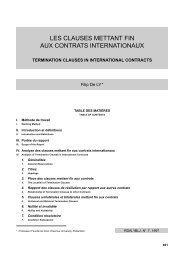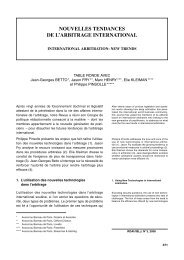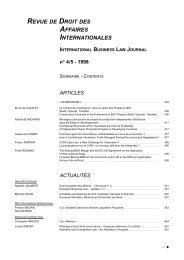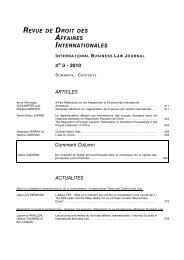ACTUALITES - Droit du commerce international et des affaires ...
ACTUALITES - Droit du commerce international et des affaires ...
ACTUALITES - Droit du commerce international et des affaires ...
You also want an ePaper? Increase the reach of your titles
YUMPU automatically turns print PDFs into web optimized ePapers that Google loves.
DROIT DU COMMERCE INTERNATIONAL ET DE LA CONCURRENCEdisproportionate to the funding needs of providing thepublic service.n’ait pas en 1999 puisé dans ses réserves ne sauraitétablir l’existence d’une aide d’Etat <strong>et</strong> n’implique pas queles réserves en 1999 étaient disproportionnées par rapportaux besoins de service public.MEMBER STATESPLMETATS MEMBRES DE L’UE–EEEPLMUK: COURTS’ CAUTIOUS APPROACH ON PUNITIVEDAMAGESAfter the European Commission decision which finedVitamins cartel members e 855.22 million, DevenishNutrition Ltd, an animal feed manufacturer, sued withother claimants the Vitamins cartel members befor<strong>et</strong>he High Court. As purchaser of the concerned pro<strong>du</strong>cts,it asked for compensatory damages, for restitutionaryand exemplary damages and also for punitivedamages. Such a claim was based on the caselaw in Black, where the House of Lords had heldthat, in exceptional cases where normal remedies ofdamages, specific performance and injunction wereinadequate compensation for breach of contract, theCourt could grant a restitutionary award. Therefore,the High Court considered an award of exemplaryor restitutionary damages would “amount to doublejeopardy” because of the European Commission decision.The High Court points out the US d<strong>et</strong>rebling policy.Devenish Nutrition Ltd brought an appeal againstthe High Court decision which was dismissed on October14, 2008.According to Lord Justice Tuckey, “Community law neitherprevented nor required the recognition in domesticlaw of restitutionary award as a remedy for breach ofstatutory <strong>du</strong>ty”. He added that there is no underlyingd<strong>et</strong>errence policy in civil claims and that damagesshould be limited to provable loss suffered as a resultof the cartel. He also rejected the idea that anaward based on the profits made by the cartel shouldbe granted. According to Lord Justice Longmore:“The only real argument in favour [of punitivedamages] [...] is the argument of policy thatcartels are a notorious evil and the civil courtsshould in some way provide an incentive »for their eradication [...] But it does not seemto me to be right for the courts to bring thisstep on their own initiative”.ROYAUME-UNI : APPROCHE PRUDENTE DESJURIDICTIONS SUR LES DOMMAGES ET INTERETSPUNITIFSAprès la décision de la Commission européennecondamnant les membres <strong>du</strong> cartel <strong>des</strong> vitamines à 855,22millions e 16 , la société Devenish Nutrition Ltd, fabriquantd’aliments pour animaux, a engagé une action devant laHigh Court avec d’autres demandeurs à l’action contre lesmembres <strong>du</strong> cartel. 17 Ach<strong>et</strong>eur <strong>des</strong> pro<strong>du</strong>its concernés, ellea demandé <strong>des</strong> dommages <strong>et</strong> intérêts compensatoires, <strong>des</strong>dommages <strong>et</strong> intérêts de restitution de l’in<strong>du</strong>, ainsi que <strong>des</strong>dommages <strong>et</strong> intérêts punitifs. Elle a fondé sa deman<strong>des</strong>ur l’arrêt Black, dans lequel la House of Lords avait ditpour droit que dans <strong>des</strong> cas exceptionnels où le recours à<strong>des</strong> dommages <strong>et</strong> intérêts compensatoires normaux, <strong>des</strong>exécutions particulières <strong>et</strong> <strong>des</strong> injonctions constituent <strong>des</strong>compensations inadéquates pour violation <strong>du</strong> contrat,la Cour peut accorder <strong>des</strong> dommages <strong>et</strong> intérêts derestitution de l’in<strong>du</strong>, si la justice le requiert. 18 La High Courta estimé que l’octroi de dommages <strong>et</strong> intérêts derestitution, ou punitifs équivaudrait à une double peine enraison de la condamnation par la Commission européenne.La High Court y a vu la raison de la politique américainede d<strong>et</strong>rebling. 19 Devenish Nutrition Ltd a fait appel de ladécision de la High Court 20 qui a été rej<strong>et</strong>é le 14 octobre2008. 21Le Lord Justice Tuckey a conclu que “le droitcommunautaire n’empêche ni ne requiert la reconnaissanceen droit national <strong>des</strong> dommages <strong>et</strong> intérêts de restitutioncomme un remède à la violation d’une obligation légale”. 22Selon lui, il n’y a pas de politique de dissuasionsous-jacente dans les actions civiles. Les dommages <strong>et</strong>intérêts devraient être limités aux pertes avérées commeétant le résultat <strong>du</strong>dit cartel. L’idée qu’une récompense,fondée sur les profits réalisés par le cartel, devrait êtreaccordée, est rej<strong>et</strong>ée. « Le seul véritable argument en faveurde dommages <strong>et</strong> intérêts punitifs est un argument politiquequi veut que les cartels sont un mal notoire, <strong>et</strong> que lesjuridictions civiles devraient d’une façon, ou d’une autre,fournir une incitation pour leur éradication ». Mais il ne206 © 2009 Thomson Reuters (Legal) Limited and Contributors









